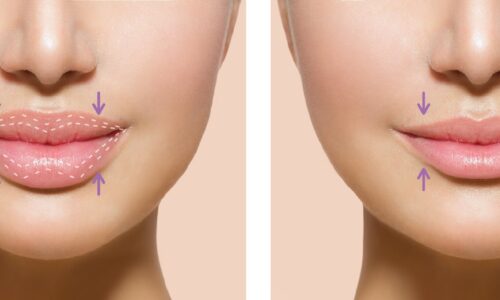Lip Reduction Treatment in Mumbai-
Sculpt Sublime (Plastic Surgery Clinic)

Surgery is much different from a dermatological procedure, and there are also more risks, including infection and scarring. Still, lip reduction surgery is considered safe overall Trusted Source when performed by an experienced and board-certified provider. Learn more about what to expect from this type of procedure to see if it’s the right fit for you.
Lip reduction surgery recovery time
Swelling and redness can last for a few days, but you should be able to talk and move around more comfortably after this time.
It can take a week or two for the sutures to come out and for your lips to completely heal. While this can seem like a big time commitment, the time frame is a lot shorter compared to other cosmetic surgeries. As a general rule of thumb, you should expect to take a full week off work.
During recovery, your doctor may recommend applying ice packs to your lips. You might also consider over-the-counter pain relievers, such as acetaminophen or ibuprofen. See your surgeon if your postsurgery symptoms last longer than two weeks.
Lip reduction surgery candidates
Candidates for lip reduction surgery are generally those who want to change their facial appearance. Most people who get this type of surgery have naturally large lips, or they have larger than desired lips from a prior augmentation surgery.
Your lips can also change with age. Lip reduction may be a viable solution for any resulting asymmetry. It’s also common to get the lip reduction procedure in addition to other aesthetic treatments, such as dermal fillers. Lip reduction techniques may also be used as corrective procedures for cleft lipTrusted Source and palate. Still, not everyone is a candidate.
Autoimmune and inflammatory diseases can limit your candidacy, especially if your condition causes frequent mouth sores. You’ll want to disclose your full medical history with your surgeon in advance so that you can limit your risk of side effects. Smoking is also off-limits before surgery, as well as during your recovery. You can’t get lip surgery if you have cold sores or other types of mouth sores. Infections around the mouth area can also limit your time frame for surgery. Your surgeon may ask that you treat the infection first and then schedule your procedure for a later time.
Be sure to tell your doctor if you have a history of cold sores or herpes blisters of the mouth. They’ll likely prescribe medication to prevent an outbreak while you’re healing.
FAQs
What is done in plastic surgery?
What is the difference between cosmetic and reconstructive surgery?
Cosmetic surgery is performed to reshape normal structures of the body in order to improve appearance and self-esteem. Cosmetic surgery is usually not covered by health insurance because it is elective.
Reconstructive surgery is performed on abnormal structures of the body caused by congenital defects, developmental abnormalities, trauma, infection, tumors or disease. In general, reconstructive surgery is performed to improve function, but may also be completed to approximate a normal appearance.
Reconstructive surgery is typically covered by most health insurance policies, although coverage for specific procedures and levels of coverage may vary greatly.
If I have Botox or Restylane, how often would I need to repeat the injections?
Botox lasts about three to four months, and the treatment can be repeated as needed. When it wears off, you will begin to notice increased muscle action and some reformation of the wrinkles. It appears that with repeated use, the effect of Botox becomes longer lasting.
Restylane injections last for about six months, and can also be repeated as needed.
How do I know what size breast implant is right for me?
The decision is based on a number of factors, including the patient’s desires, reasons for the surgery and overall health.
For example, are you doing it because you feel your breasts are too small relative to your body contour or are you unhappy with the size and firmness of your breasts following pregnancy, breastfeeding or major weight loss? Unevenness between the breasts can also be a motivating factor. Your surgeon can help you make the right decision during your pre-surgical appointment(s).